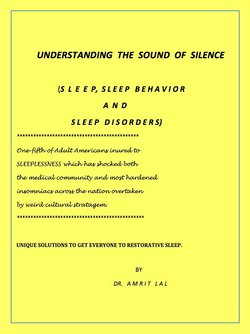Читать книгу Understanding the Language of Silence - Sleep, Sleep Behavior and Sleep Disorders - Dr. Amrit Lal - Страница 20
На сайте Литреса книга снята с продажи.
BI-DIRECTIONAL LINK
ОглавлениеThere is a bi-directional relationship between a health condition and sleep disorder. People with poor health or chronic medical and psychiatric conditions have more sleep problems. And those with sleep disorders have a greater share of health and psychiatric issues.
Older individuals often suffer from multiple health conditions (co-morbidity). According to a National Sleep Foundation survey in the United States, of adults aged 65 years and above, “those with more medical conditions, including cardiac and pulmonary disease and depression, reported significantly more sleep complaints.” Studies examining the prevalence of sleep disturbances in patients with chronic medical diseases have reported that 31% of arthritis and 66% of chronic pain patients report difficulty falling asleep, while 81% of chronic pain, and 33% of diabetes patients report difficulty staying asleep. Chronic sleep loss may accelerate type 2 diabetes. Research establishes that just one week of sleep loss altered secretion of hormone in sleep- deprived individuals and their capacity to metabolize carbohydrate meal, compared with the sleep-recovery period with their ability to secrete and respond to the hormone insulin falling by 30 per cent – changes similar to those found in patients with type-2 diabetes. In addition, level of stress hormone, cortisol, rises which mimics levels that are often seen in older people and may be involved in age-related insulin resistance and memory loss, – the men’s blood sugar level taking 40 per cent longer to drop following a high-carbohydrate diet. Of course, blood sugar and hormone concentrations are restored after the sleep recovery period.
Sleep deprivation tends to overeating; some 300 to 500 more calories per day than people who do not. As Orfeu Buxton, a neuroscientist at Brigham and Women Hospital in Boston School comments, “You prefer different foods and more of them and at wrong time of the day … Nobody is eating salad in the middle of the night.” A pattern of insufficient sleep raises risk of obesity and diabetes. In a study conducted under him and published in Translational Medicine (2012), his team allowed volunteers roughly five and half hours of sleep over a period of 3 weeks, “varying timing in a manner similar to the experiences of shift worker or with jet lag.” It was observed that restricting sleep and disrupting circadian rhythm lowered melatonin and spiked glucose levels after the participants took breakfast – “an indication that insulin producing pancreas is not fully doing its job.” In addition, Baxton’s study observed, “participants saw their basal metabolic rate decline by 8 per cent.” This may look insignificant, but other things remaining unchanged, this translates into 10 to 12 pounds a year. Even a single night of inadequate sleep can cause daylong elevation in hypertensive individuals, apart from the fact that inadequate sleep is associated with calcification of coronary arteries (arteriosclerosis) and raised levels of inflammatory factors linked to heart disease.
Hypertension is associated with snoring and sleep apnea and heart failure. Menopause and its accompanying hot flashes, changes in breathing and decreased hormone levels can lead to insomnia. Gastro-esophageal reflex disease (GERD) is another common cause of sleep problem. Diseases like Parkinson’s disease and multiple sclerosis also common causes of sleep problems.
The causes of “primary” sleep order lies within the individual itself. They may be the result of endogenous disturbances in sleep-wake rhythms or because of behavior conditioning. During a medical diagnosis it is important to determine if anxiety and depression were the more likely factors contributing to sleep problems and those with sleep problems more likely to develop health issues.
